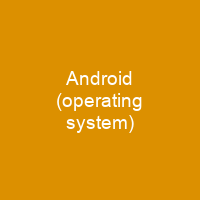Android: The Dominant Mobile Operating System
Imagine a world where your smartphone, tablet, and even your car run on the same operating system—Android. This open-source powerhouse has transformed the way we interact with technology. Android is not just an operating system; it’s a revolution in mobile computing that has captured the hearts of billions worldwide. But what exactly makes Android so special? Let’s dive into its history, features, and impact on our daily lives.
The Genesis of Android
Wasn’t Android always there? Not quite. In 2003, a small company called Android Inc., founded by Andy Rubin, Chris White, Rich Miner, and Nick Sears, laid the groundwork for what would become one of the most influential operating systems in history.
The Open Handset Alliance
Who exactly is behind this open-source magic? The Open Handset Alliance (OHA) was formed to develop a comprehensive platform for mobile devices. This consortium, including giants like Google, device manufacturers, wireless carriers, and chipset makers, aimed to create an open and innovative ecosystem.
The Evolution of Android
From its humble beginnings in 2008 with the HTC Dream (T-Mobile G1), Android has come a long way. With each update, it’s become more intuitive, secure, and feature-rich. The introduction of Google Play Store, sharing writing access to MicroSD memory cards, and the expansion into various devices like tablets, TVs, and even cars have solidified its position as a versatile platform.
The Android Open Source Project (AOSP)
Is AOSP just another name for Android? Not quite. While AOSP is the open-source project that develops the core of Android, most devices run proprietary versions developed by Google. This dual nature allows for both innovation and stability.
The Challenges and Triumphs
Android has faced its share of challenges, from fragmentation to security concerns. However, it’s also seen remarkable triumphs, such as becoming the most used operating system worldwide on smartphones since 2011. The introduction of Project Treble and other initiatives have helped streamline updates and improve user experience.
The Future of Android
Where is Android headed? With ongoing developments in virtual reality, smart home integration, and even potential expansion into laptops and desktops, the future looks bright. Google’s commitment to open-source and continuous improvement ensures that Android will remain a cornerstone of modern technology.
The Impact on Users
How does Android affect your daily life? From seamless app installation to intuitive user interfaces, Android enhances our mobile experiences. Its open nature allows for customization and community-driven innovation, making it a dynamic platform that evolves with the needs of its users.
The Security Landscape
Is Android safe from cyber threats? While Google has made significant strides in security, including monthly updates and robust verification processes, users must remain vigilant. Regularly updating apps and being cautious about permissions can help mitigate risks.
The Future of Mobile Computing
Will Android continue to dominate the mobile landscape? Given its widespread adoption and ongoing innovation, it’s likely that Android will remain a dominant force in mobile computing for years to come. However, the competitive nature of technology means that other platforms may challenge its supremacy.
The Conclusion
Is there anything more to explore about Android? Absolutely! From its open-source roots to its global impact, Android is a fascinating story of innovation and adaptation. As we move forward, the evolution of this operating system will continue to shape our digital world.

As we conclude, remember that Android is not just an operating system; it’s a testament to the power of open-source collaboration and innovation. Its journey from a small startup to a global leader in mobile computing is nothing short of remarkable.
You want to know more about Android (operating system)?
This page is based on the article Android (operating system) published in Wikipedia (retrieved on February 13, 2025) and was automatically summarized using artificial intelligence.





